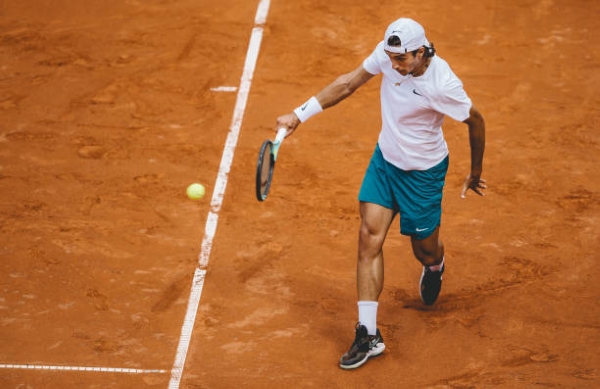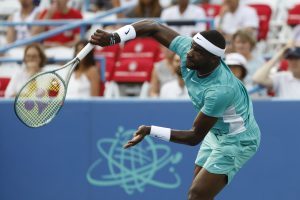Lorenzo Musetti just enjoyed a successful week in Hamburg. It is highly unlikely that the effect on global culture of his first trip to the city, which culminated in his winning the European Open at the weekend, will be as profound as that of The Beatles’ time in the German port city, which John Lennon, for one, always maintained was the making of the band. However, the impact of Hamburg on the young Italian’s own career might prove to be momentous.
Musetti beat Carlos Alcaraz in the Hamburg final, in probably the best men’s three-set match of the year so far. It was a wonderful encounter, which the young Italian initially looked as if he might run away with, after winning the first set and going a break up early in the second set. Indeed, he served for the match at 5-4 in the second, only to be broken by Alcaraz, and then had three more match-points in the ensuing tiebreak, which again he could not convert.
Ultimately, Alcaraz survived five match-points in total at the end of the second set to take the match to a third set. Given the brilliant young Spaniard’s form this year, it appeared inevitable that he would ultimately win the match. But Musetti stunned everyone, perhaps including Alcaraz himself, by eventually winning 6-4 6-7 (6-8) 6-4, to claim his first ever ATP title and rise to #31 in the ATP rankings.
The ultimate rollercoaster of a week
After the match, Musetti resorted to what must be the definitive sporting cliché (albeit in a second language) to call his week in Hamburg a “rollercoaster”. However, for once the cliché might just have been appropriate. He recalled surviving match-points against Serbia’s Dušan Lajović in his first round match, not to mention the difficulties that he had encountered in his second round match against Finland’s Emil Ruusuvuori, yet another of the young guns who seem to be massing in preparation for the eventual, inevitable end of The Big Three era.
In addition, Musetti had almost climbed out of his rollercoaster car himself in the semifinal against Argentina’s Francisco Cerundolo, when he wasted his first match-point by producing an under-arm serve that Cerundolo superbly responded to.
However, on each of those occasions, Musetti seemed to demonstrate a new-found maturity by not giving in to adversity but overcoming it. He saved the match-points against Lajović; he eventually did serve out for a straight-sets win against Ruusuvuori; and he saved himself from potentially enduring embarrassment against Cerundolo by finally winning the second set of the semifinal on a tie-break.
Nevertheless, even those comebacks were as nothing compared to his comeback against Alcaraz. Having seemingly thrown away the match against the great Spaniard, Musetti rallied magnificently. As he said afterwards, somehow he remained calm and patient, and eventually broke Alcaraz at the end of the third set to seal the victory and clinch the title.
Ideal preparation can be over-rated
Perhaps the most revealing admission in Musetti’s post-match interviews was that he had been sick at the start of the week, literally “throwing up”, so much so that he had not believed for a moment that he had a chance of winning a single match, let alone the entire tournament. Consequently, his Hamburg triumph might be yet more proof that for athletes the ideal preparation can be over-rated and sometimes it is best for them just to wing it and see what happens.
The classic, indeed defining, example of that is the victory of Denmark at the 1992 European Football Championship. Then, the Danish players were literally summoned from their holiday beaches to be last-minute replacements for Yugoslavia, who had qualified ahead of them but were subsequently banned from the tournament because of the break-up of the country and the start of the Balkan wars. Musetti’s own preparation (or lack of it) in Hamburg may not have been quite as dramatic as that of the Danish footballers thirty years ago. None the less, it shows that sometimes it really is best not to overthink things.
In particular, because he was probably still lacking at least a little energy after being so ill earlier in the week, Musetti may have decided that he did not have any energy to waste on the kind of petulant, even self-defeating antics that have occasionally marked his game in the past. Instead, perhaps out of sheer necessity, he showed an extraordinary level of resilience all week, even against the mighty Alcaraz.
The future for “Must-See” Musetti
For Musetti, Hamburg could be hugely significant, but it could also be important for men’s tennis as a whole. Alcaraz has been so astonishingly good this season, especially on clay (his loss to Musetti was only his third on the red stuff all season), that there was a slight fear building that once The Big Three finally depart he would prove, to use a classic tennis term, “too good” for all his contemporaries.
However, two Italian victories over the precocious Alcaraz have reminded everyone that even the very best players can lose, at least occasionally. First, Jannik Sinner had beaten Alcaraz at Wimbledon, on their first ever encounter on grass, to remind everyone of his own impressive credentials as a potential future Major-winner. And yesterday Musetti, with the best (or at the very least the most beautiful) backhand in tennis to the fore, proved that Sinner is not the only young Italian man who could challenge for the greatest prizes in tennis.
Extraordinarily, Italy has only ever had two male Major champions: Nicola Pietrangeli, who won the French Open in 1959 and 1960; and Adriano Panatta, who triumphed once at Roland Garros, in 1976. Now, in Sinner and Musetti, it is possible that Italy will have two male Major champions in the next decade, and that is without even mentioning the older and much more established Matteo Berrettini, who was runner-up at Wimbledon last year.
For Musetti, the last week in northern Germany has been a triumphant vindication of all his potential. As a former Junior World No.1, he has long been earmarked for greatness, especially because of that astonishing backhand, which has already drawn comparison with the greatest single-handed backhands ever seen in tennis, from Henin to Federer.
Until now, however, he has not been able to put all his obvious potential together for long enough even to reach an ATP final, let alone win one. That all changed in Hamburg. As a result, in time he may look back on it as fondly as The Beatles did, knowing that it was the making of him, both as a man and as a player.
Main photo:
Embed from Getty Images






